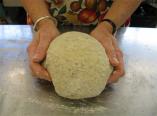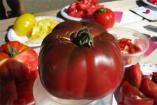Preferring as I do the simplicity of cooking with ingredients that are easy and relatively inexpensive to lay my hands on, I am suspicious of molecular gastronomy. It strikes me as an unsustainable novelty, requiring specialized equipment and highly processed ingredients. So I am with the feeling behind the Italian government’s ban on chemical ingredients used in molecular gastronomy, in the interests of public safety. Though I think if you really want to eat the stuff, you should be willing to bear the consequences – I doubt most people would be eating Gibbs, Vauquelin or Baumé on a daily basis anyway.
It is hard sometimes not to feel that big biobusiness is winning, through sheer massive persistence and economic might. The approval of genetically modified potatoes and feeds by the European Union is disappointing news, to say the least, coming as it does
“over the resistance of half or more of the EU’s 27 countries”
and
“opposition to such foods by European consumers, who worry about risks such as human resistance to antibiotics and the development of “superweeds” that are impervious to herbicides.”
The problem with letting GMO/GE (pick your acronym of choice) feeds into Europe is that this contaminates European animal products, and it also allows the strong possibility (inevitability?) of rogue crops springing up where the seed falls. EU legislators have apparently learned nothing from the experiences of Mexican corn farmers and Canada’s own Percy Schmeiser.
Meanwhile, Canada has more GE headaches, around the flax contamination issue. Here’s how the GE-Free BC folk are tackling it, by asking for support for Alex Atamanenko‘s private members Bill C474, An Act respecting the Seeds Regulations (analysis of potential harm) with a call to action before the bill is debated on March 17:
In the wake of the discovery of Genetically Engineered flax in shipments to Europe 10 years after that flax was removed from the market, and subsequent bans on Canadian exports of flax to Europe, Bill C-474 will help put pressure on the Canadian government to test adequately GE crops.
Please contact your MP through the CBAN website.
If you would like to start a petition to present to your MP, contact GE Free BC at gefreebc07@yahoo.ca to get a blank petition form. Your MP must present the petition in the House of Commons if you get 200 signatures.









